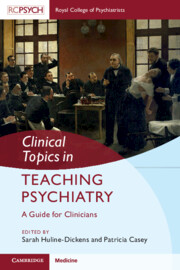Book contents
- Clinical Topics in Teaching Psychiatry
- Clinical Topics in Teaching Psychiatry
- Copyright page
- Dedication
- Contents
- Contributors
- A Note on the Cover
- Introduction
- Section 1 Teaching and Preparation
- Section 2 Teaching Methods
- Section 3 Feedback, Assessment and Supervision
- Section 4 Bridging the Gaps: Foundation Years and Interprofessional Education
- Section 5 Technologies Old and New
- Section 6 Supporting the Trainee in Difficulty
- Chapter 22 The Trainee in Difficulty: Where Are We Now?
- Chapter 23 Coaching and Mentoring: An Overview for Trainers in Psychiatry
- Index
- References
Chapter 23 - Coaching and Mentoring: An Overview for Trainers in Psychiatry
from Section 6 - Supporting the Trainee in Difficulty
Published online by Cambridge University Press: 24 November 2022
- Clinical Topics in Teaching Psychiatry
- Clinical Topics in Teaching Psychiatry
- Copyright page
- Dedication
- Contents
- Contributors
- A Note on the Cover
- Introduction
- Section 1 Teaching and Preparation
- Section 2 Teaching Methods
- Section 3 Feedback, Assessment and Supervision
- Section 4 Bridging the Gaps: Foundation Years and Interprofessional Education
- Section 5 Technologies Old and New
- Section 6 Supporting the Trainee in Difficulty
- Chapter 22 The Trainee in Difficulty: Where Are We Now?
- Chapter 23 Coaching and Mentoring: An Overview for Trainers in Psychiatry
- Index
- References
Summary
Atul Gawande, a surgeon and professor of public health, delivered a TED talk in April 2017 called ‘Want to get great at something? Get a coach’ (Gawande 2017). He begins his talk by describing an innovation in coaching by training nurses to observe other nurses acting as birth attendants in rural India. The way the local birth attendants were handling infected material was leading to significant mortality. The coaching intervention completely reversed this trend and the approach of the coaches was found to be just right in facilitating change rather than imposing change from outside. This was transformative in delivering better care.
What has this got to do with the professional development of psychiatrists? The connection is, of course, coaching (or mentoring), but it also symbolizes the way psychiatrists often naturally seek to influence beneficial change in indirect ways.
In the UK in 2003, Dean wrote a brief editorial for Advances in Psychiatric Treatment about the importance of having a mentor for newly appointed consultants (Dean 2003). This will be the main context of thinking about coaching and mentoring for many psychiatrists.
- Type
- Chapter
- Information
- Clinical Topics in Teaching PsychiatryA Guide for Clinicians, pp. 274 - 286Publisher: Cambridge University PressPrint publication year: 2022

